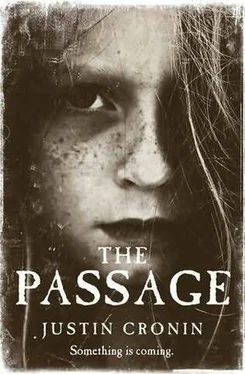“Well, I guess that’s it now,” Muncey said when the spasms had passed. Peter could find no fear anywhere in the soldier’s eyes, only a calm acceptance. All the color had seeped from his face, like water down a drain. He lifted his bound hands to wipe the sweat from his brow with the bloody rag. “It’s like they say, the way it comes on. If it’s no trouble, I’d like it on the blade, Major. I want to feel it coming out of me.”
Greer nodded his approval. “Good man, Muncey.”
“Donadio should be the one to do it, if that’s all right. My mama always said you should dance with the one who brung you, and she was kind enough to bring me back. She didn’t have to do that.” His eyes were blinking now, the sweat was pouring down. “I just wanted to say it’s been an honor, sir. The general, too. I wanted to come home to say that. But I think you better step to it, Major.”
Greer rose to his feet and backed away. Everyone snapped to attention. He raised his voice to all of them:
“This man is a soldier of the Expeditionary! It is time for him to take the trip! All hail, Corporal Muncey. Hip hip… ”
“Hooray!”
“Hip hip-”
“Hooray!”
“Hip hip-”
“Hooray!”
Greer drew his blade and passed it to Alicia. Her face was composed, lacking all emotion: a soldier’s face, a face of duty. She gripped the blade in her fist and knelt before Muncey, who had bowed his head now, waiting, his bound hands slack in his lap. Alicia bent her head toward Muncey’s until their foreheads were touching. Peter saw that her lips were moving, murmuring quiet words to him. He felt no horror, only a sense of astonishment. The moment seemed frozen, not part of a flow of events but something fixed and singular-a line that, once crossed, could never be uncrossed. That Muncey would die was only a part of its meaning.
The knife did its work almost before Peter realized what had happened; when Alicia dropped her hand, it was buried to the hilt in Muncey’s chest. His eyes were open, wide and damp, his lips parted. Alicia was holding his face now, tenderly, like a mother with her child. “Go easy now, Muncey,” she said. “Go easy.” A bit of blood had risen to his lips. He breathed once more, holding the air in his chest, as if it were not air but something far more-a sweet taste of freedom, of all cares lifted, everything over and done. Then his life left him and he slumped forward, Alicia receiving him in her arms to ease his body’s passage to the muddy ground of the garrison.
Peter did not see her all through the next day and then the day after. He thought of sending her a message through Greer, but he didn’t know what to say. In his heart he knew the truth: Alicia was gone. She had slipped into a life he had no part of.
They’d lost a total of forty-six men, including General Vorhees. It stood to reason that some were not dead but had been taken up; the talk among the men was of sending out search parties. But Greer said no. The window for their departure was closing, if they were going to make their rendezvous with Third Battalion. Seventy-two hours, he announced, and that would be the end of it.
By the end of the second day, the camp was nearly buttoned up. Food, weapons, gear, most of the larger tents except the mess-all were packed and ready to go. The lights would remain, as would the large fuel tankers, now mostly empty, and a single Humvee. The battalion would be traveling south in two groups: a small scouting party on horseback, led by Alicia, with the rest following in the trucks and on foot. Alicia was now an officer; with so many men lost, including all but two squad leaders, the ranks had thinned, and Greer had given her a battlefield commission. She was now Lieutenant Donadio.
Greer had lifted the order to keep Sara and Amy segregated; a body was a body, he said, no reason at this point to split hairs. A lot of men had been injured in the raid; mostly small things, cuts and scratches and sprains, but one soldier had a broken collarbone, and two more, Sancho and Withers, had been badly burned in the detonation. The battalion’s two medical corpsmen had been killed, so with Amy helping her, Sara had taken over caring for the wounded, preparing them as best she could for the trip south. Peter and Hollis had been assigned to the packing crews, whose job was to sort through the contents of two large supply tents, culling what would travel with them and moving the rest to storage in a series of dugouts spread through the compound. Michael had more or less disappeared into the motor pool; he slept in the barracks, took his meals elbow to elbow with the other oilers. Even his name was gone, replaced by Lugnut.
Over everything, the question of the evacuation hung like a blade. Peter had yet to give Greer his answer, because the truth was, he didn’t know. The others-Sara and Hollis and Michael and even Amy, in her quiet, inward way-were all waiting, giving him the space to decide. That they said nothing on the subject made this fact all the more obvious. Or maybe they were simply avoiding him, for all he knew. Either way, leaving the safety of the garrison now seemed more perilous than ever. Greer had cautioned him that with the mine disturbed, the woods would be crawling; perhaps, he suggested, it would be best to wait until they returned next summer. He’d talk to Division, persuade them to mount a proper expedition. Whatever’s up that mountain, Greer said, it’s been there a long time. Surely it can wait another year.
The evening of the second day after Alicia’s return, Peter came into his tent to find Hollis alone, sitting on his cot. A winter parka was draped over his shoulders; he was holding a guitar in his lap.
“Where’d you find that?”
Hollis was idly plucking notes, his face drawn in concentration. He looked up and gave a smile through his heavy beard, which by now climbed halfway up his cheeks. “One of the oilers had it. Friend of Michael’s.” He blew on his hands and plucked a few more notes, nibbling around the edges of a melody that Peter couldn’t quite discern. “It’s been so long I thought I’d forgotten how to play.”
“I didn’t know you could.”
“I can’t, not really. Arlo was always the one.”
Peter sat on the bunk across from him. “Go on. Play something.”
“I don’t remember much. Just a song or two.”
“Then play that. Play anything.”
Hollis shrugged; but Peter could tell he was happy to be asked. “Don’t say I didn’t warn you.”
Hollis did something with the strings, tightening and testing, then began. It took Peter a moment to realize what he was hearing: one of Arlo’s funny, made-up songs, the ones he used to play for the Littles in the Sanctuary, yet different somehow. The same but not the same. Under Hollis’s fingers, it was deeper and richer, full of an aching sadness. Peter lay back on his cot and let the notes wash over him. Even when the song had ended, he could still feel it inside him, like an echo of longing in his chest.
“It’s all right,” he said. He took a deep breath, fixing his eyes on the tent’s sagging ceiling. “You and Sara should take that convoy. Michael, too. I doubt she’ll go without him.” When Hollis said nothing, Peter rose on his elbows and faced his friend. “It’s okay, Hollis. I mean it. That’s what I want you to do.”
“It’s what Vorhees said, when we first got here. About his men, the oath they take. He was right. I’m no good for this anymore, if I ever was. I really love her, Peter.”
“You don’t have to explain. I’m glad for you both. I’m glad you have this chance.”
“What will you do?” Hollis asked.
The answer was obvious. Still, it needed to be said. “What we came to do.”
It was strange. Peter felt sad, but something else as well. He felt at peace. The decision was behind him now; he was free of it. He wondered if this was how his father had felt the night before his final ride. Watching the ceiling of the tent shaking in the wintry wind, Peter recalled Theo’s words that night in the power station, all of them sitting around the table in the control room, drinking shine. Our father didn’t go out there to let it go. Whoever thinks so doesn’t understand the first thing about him. He went out there because he just couldn’t stand not knowing, not for one more minute of his life . It was the peace of truth that Peter felt, and he was glad for it, down to his bones.
Читать дальше












